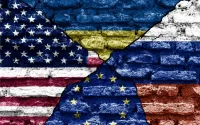Common Dreams / Published on Thursday, October 30, 2003 by the Financial Times/UKThomas Catán in London
The US-led provisional authority in Iraq may be breaking international law by selling state assets, experts have warned, raising the prospect that contracts signed now by foreign investors could be scrapped by a future Iraqi government.
International businesspeople attending a conference in London this week heard that some orders issued by the US-led Coalition Provisional Authority (CPA) may be in breach of the 1907 Hague Regulations and the Fourth Geneva Convention.
"Is what they are doing legitimate, is it legal?" asked Juliet Blanch, a partner at the London-based international law firm Norton Rose. "Most [experts] believe that their actions are not legal", she said. "There would be no requirement for a new government to ratify their [actions]."
International law obliges occupying powers to respect laws already in force in a country "unless absolutely prevented" from doing so.
According to international law experts, that throws doubt on the legality of the CPA's September 19 order opening the Iraqi economy to foreign investment. In what amounted to a blueprint for transforming Iraq into a market economy, Order 39 permitted full foreign ownership of a wide range of state-owned Iraqi assets, barring natural resources such as oil.
However, such sweeping economic reform may not be legal, as the UK government was privately warned by its chief law officer in the first days of the war. In his private advice, later leaked to the press, Lord Goldsmith wrote that "the imposition of major structural economic reforms would not be authorized by international law."
The British government will not now comment on the attorney general's advice, which it maintains was confidential.
Questioned in parliament by Shirley Williams, the Liberal Democrat leader of the House of Lords, a minister argued that the government was "confident that their policies and actions in Iraq are right and consistent with the UK's international obligations."
However, international experts say foreign investors could face a wide range of legal problems in Iraq. Not least is the fact that Order 39 is "strictly contrary to the Iraqi constitution," according to Stephen Nelson, a partner at Squire, Sanders & Dempsey, speaking before the conference on Monday.
Indeed, the Iraqi constitution - which cannot legally be altered without the consent of the Iraqi people - contains a wide range of other provisions that could be highly troublesome for foreign investors.
Iraqi law bans private ownership of "national" resources or "the basic means of production". It also prohibits foreign ownership of real estate or the establishment of companies in Iraq by non-Arab foreigners.
There is also the question of what will happen to existing contracts with foreign companies, signed with the government of Saddam Hussein.
The CPA has yet to announce what will become of pre-existing contracts, many of which are held by Russian, Chinese and French companies.
However, international law experts have said they could be enforced, raising the possibility that contracts with the ousted regime might be more enforceable than those signed with the CPA.






